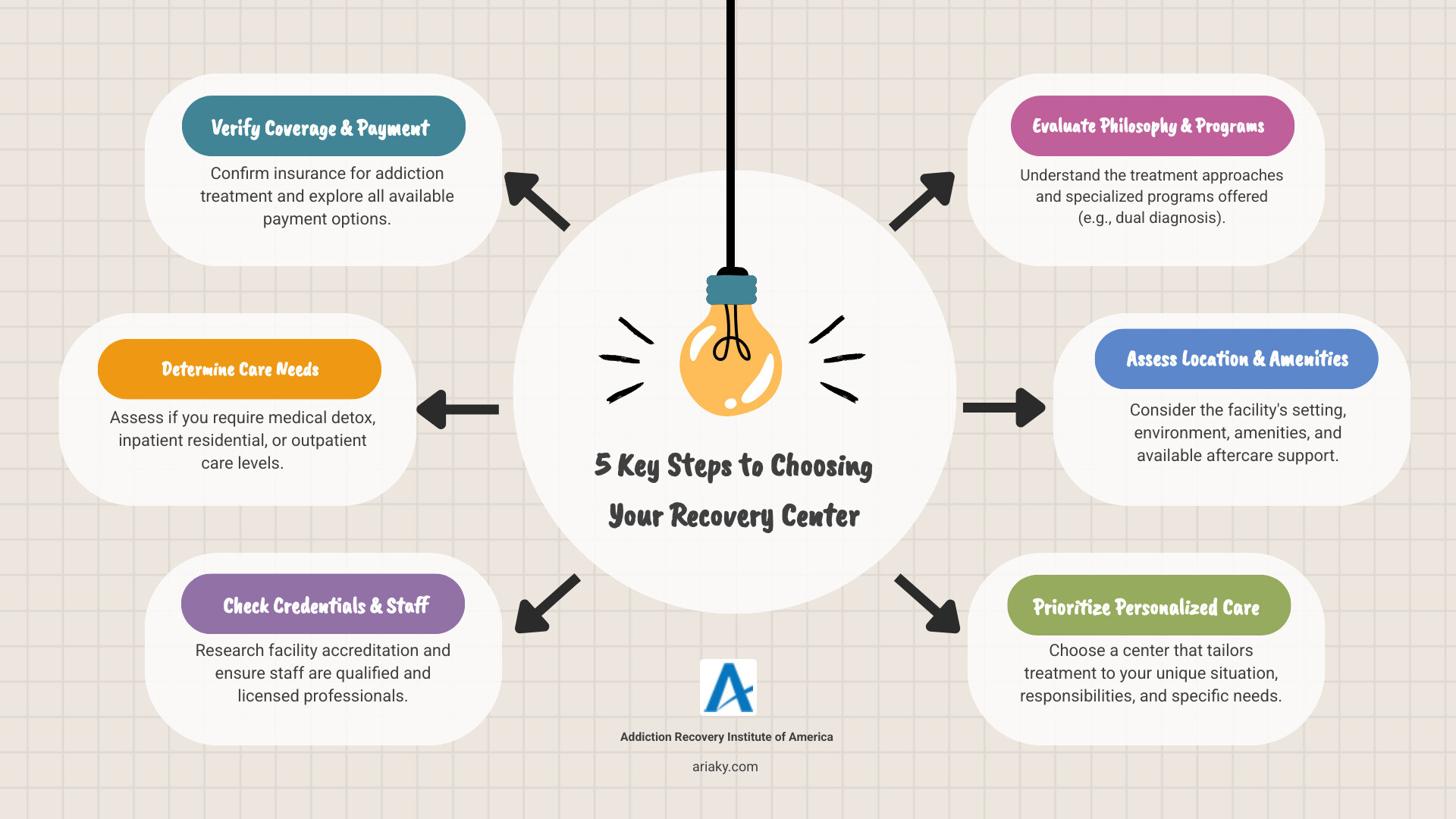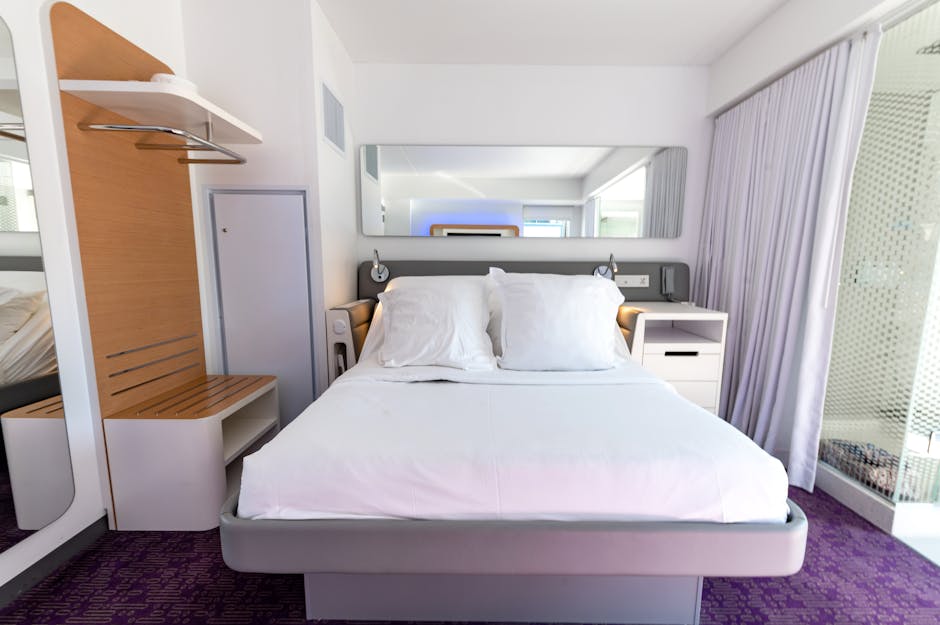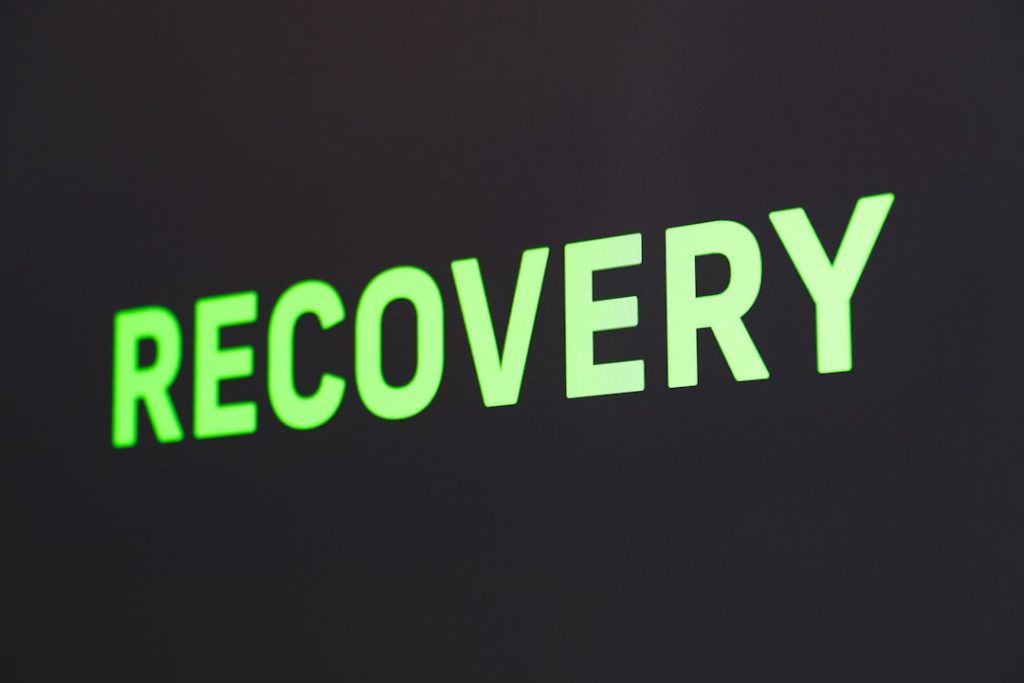Why Finding the Right Recovery Center Near You Matters
When searching for a recovery center near me, you’re taking a courageous step. The right treatment center can be the difference between temporary sobriety and a lasting recovery that transforms your future.
Quick Guide to Finding Local Recovery Centers:
- Start with your insurance – Call to verify coverage for addiction treatment.
- Assess your needs – Determine if you need detox, inpatient, or outpatient care.
- Check credentials – Look for state-licensed and accredited facilities with qualified staff.
- Consider location – Balance proximity to home with treatment quality.
- Ask about aftercare – Ensure long-term support is available.
According to the National Survey on Drug Use and Health (NSDUH), millions of Americans face mental health or addiction problems each year. You are not alone in this journey.
The search for treatment shouldn’t be overwhelming. Every recovery center offers different approaches, from evidence-based medical care to holistic therapies. Some focus on luxury amenities, while others emphasize community support.
What matters most is finding personalized care that fits your unique situation. This includes considering factors like:
- Whether you need medical detox.
- If you have co-occurring mental health conditions like anxiety or depression.
- Your work and family responsibilities.
- The specific substances you’re struggling with.
As one recovery center puts it: “We tailor your recovery so you can remain connected to your life and responsibilities in the world outside so your transition to normal life is as smooth as possible.”

Recovery center near me terms to remember:
Understanding the Levels of Addiction Treatment

Finding the right recovery center near me means understanding that addiction treatment comes in different levels of intensity. The key is matching your specific needs with the right level of care.
Medical detoxification is often the starting point. It’s a medically supervised process that keeps you safe while your body adjusts to life without substances. Withdrawal can be dangerous, so 24/7 medical care is crucial to manage symptoms and ensure you’re physically ready for the next phase.
Inpatient residential programs provide the most intensive level of care. You live at the facility, completely immersed in a structured environment that removes daily triggers and distractions, letting you focus entirely on healing.
Partial Hospitalization Programs (PHP) are a step down, offering intensive treatment during the day while you return home at night. This works well if you have a stable living situation.
Intensive Outpatient Programs (IOP) provide even more flexibility. You might attend sessions a few times a week while maintaining work or family responsibilities, making it ideal for those who need ongoing guidance but can’t step away from daily life.
Dual diagnosis treatment is critical because addiction rarely travels alone. Addressing co-occurring mental health issues like anxiety, depression, or trauma alongside substance use dramatically improves your chances of lasting recovery.
If you’re feeling overwhelmed, a confidential call to a treatment center can help you steer these options.
What is Inpatient vs. Outpatient Care?
Choosing between inpatient and outpatient care is about what fits your situation best.
Inpatient benefits center on complete immersion in a structured environment, removing you from triggers and daily stressors. With 24/7 support, this approach works well for severe addictions or unstable home environments.
Outpatient benefits shine in their flexibility. You maintain connections to your life and responsibilities while building recovery skills in real-world settings. It’s ideal when you have strong support at home and need to continue working or caring for family.
The Importance of Addressing Co-Occurring Mental Health Issues
Most people with addiction also struggle with mental health conditions. This combination, called a dual diagnosis, requires integrated treatment that tackles both issues simultaneously.
Using substances to cope with anxiety, depression, or trauma is common. Simply removing the substance without addressing the underlying issue leaves you vulnerable. Effective treatment must address the whole person, not just the addiction.
Treating these conditions together is more effective than addressing them separately. When you find a recovery center near me that offers dual diagnosis treatment, you’re getting comprehensive care that sets you up for lasting success. Needing treatment for both doesn’t make your situation more complicated—it makes you human. With the right integrated approach, you can build a stronger foundation for recovery.
Key Factors to Consider When Choosing a Recovery Center Near Me

Finding the perfect recovery center near me is easier when you focus on a few key areas. Think of it as finding a place where you’ll not just get sober, but truly heal.
Treatment Philosophy matters. Some centers focus on evidence-based care like Cognitive Behavioral Therapy (CBT), which provides proven strategies for recovery. Others take a holistic approach, treating mind, body, and spirit with yoga, meditation, or nutritional counseling. Many quality centers also use trauma-informed care, creating a safe environment to address past trauma that often drives addiction.
Staff Qualifications can make or break your experience. Look for licensed specialists—therapists, counselors, and medical professionals with proper credentials. In Kentucky, AODE-certified counselors are specially trained in addiction treatment. Medical staff experience is crucial if you need detox or have other health complications.
When you call a recovery center near me, here are essential questions to ask:
- What types of treatment programs do you offer, and how do you decide which is right for me?
- What’s your treatment philosophy and what therapies do you use?
- What are your staff’s qualifications and experience?
- How do you treat co-occurring mental health issues?
- What support do you offer for my family?
- What does a typical day look like at your center?
- How does your admissions process work?
- What kind of aftercare support will I have?
How to Evaluate the Atmosphere of a recovery center near me
The environment where you heal matters. Location and setting can impact your recovery. Some people thrive in serene, secluded environments, while others prefer being closer to urban areas to practice new skills in the real world.
Facility amenities support healing. Private rooms offer space to rest, while wellness activities like fitness or art provide healthy ways to manage stress. Good nutritious food is also vital, as it supports both physical and mental recovery.
The importance of a healing environment can’t be overstated. When you feel safe, respected, and cared for, you can focus on the hard work of recovery.
Finding a recovery center near me that offers specialized programs
Not all addictions are the same. Finding a center that specializes in your situation can make a huge difference.
Ensure the center has experience with the specific addictions treated, whether it’s alcohol, opioids, cocaine, or meth. Different substances require different medical and therapeutic approaches.
Demographics matter too. Gender-specific programs recognize that men and women often have different recovery needs. Age-specific programs can address the unique challenges faced by young adults versus older adults. Programs for professionals offer privacy and flexibility for those in high-stress careers.
The key is finding a program that understands your specific situation. Recovery isn’t one-size-fits-all, and the best centers tailor treatment to your unique path.
Navigating the Admissions Process, Costs, and Family Support

Taking the first step toward recovery can feel daunting, but the admissions process for a recovery center near me is designed to be supportive and straightforward.
The Admissions Process typically begins with a confidential call to the treatment center. Trained admissions specialists will answer your questions and help you understand your options. Next, a confidential assessment helps determine the best level of care for your needs by discussing your substance use history, mental health, and home environment. Many centers operate on a self-referral basis, meaning you can call directly without a doctor’s referral, which helps you get into treatment more quickly.
Paying for Treatment shouldn’t prevent you from getting help. Insurance verification is the first step. Most centers work with major insurance providers and can check your benefits for you. For those without insurance, private pay options are available, and many facilities offer financing options or payment plans to make treatment more manageable. You can also explore public funding options through resources like the SAMHSA National Helpline.
How Recovery Centers Support Families and Loved Ones
Addiction affects the entire family. Comprehensive recovery centers recognize that healing must extend to loved ones.
Family therapy programs help heal damaged relationships and improve communication. Educational workshops teach family members about addiction and how to best support their loved one by setting healthy boundaries and managing expectations.
Learning new communication skills is often transformative for families, helping them break unhealthy patterns. Some centers also offer intervention services to help guide a loved one into treatment.
Support groups like Al-Anon or NAMI Family Support Groups connect families with others who understand their struggle, reducing isolation and providing practical advice. There’s something powerful about sharing with others who have walked the same difficult path.
Ensuring Long-Term Success: Aftercare and Alumni Support
Recovery doesn’t end when you leave a treatment program; that’s when the real work begins. The most effective recovery center near me understands this and builds comprehensive aftercare support into their program.
Aftercare planning starts before you complete treatment. Your care team works with you to create a personalized roadmap for life after rehab. This includes identifying triggers and creating a relapse prevention plan custom to your life and circumstances.
Ongoing Support comes in many forms:
- Lifetime aftercare means you’re part of the family forever. Many centers have an open-door policy for graduates to get support or attend refresher sessions.
- Alumni programs create a community of people who understand your journey through meetings, social events, and mentorship.
- Peer support specialists are people in recovery trained to help others. They offer a unique perspective and serve as living proof that long-term sobriety is possible.
- Sober living communities bridge the gap between intensive treatment and independence, providing a structured, drug-free home with peer support.
Measuring Success in addiction treatment is personal, but quality centers track their outcomes. While success rates tell part of the story, client testimonials and reviews often reveal the full picture of renewed relationships and restored hope.
What Does a Typical Aftercare Program Include?
A well-designed aftercare program is a flexible support system that adapts to your needs.
Individual and group therapy continue, shifting focus to help you steer real-world challenges like work stress or relationship issues. You learn from others while sharing your own experiences, often forming lasting friendships.
12-step meetings or other support groups like AA or NA provide structure, accountability, and an expanding sober social network.
Regular check-ins with your treatment team help you celebrate progress, address concerns early, and adjust your aftercare plan as needed.
Community resources can help you build a fulfilling life beyond sobriety, with assistance for job placement, education, or mental health services. The goal is to help you create a life you love—one that naturally supports your recovery.
Recovery is a marathon, not a sprint. The recovery center near me that truly cares will be there for the long haul.
Frequently Asked Questions about Finding a Recovery Center
Finding the right help can feel overwhelming. Here are answers to common questions people have when searching for a recovery center near me.
How do I know which level of care is right for me?
You don’t have to figure this out alone. The right level of care depends on your specific situation. A professional assessment is the best way to determine your needs. When you call a treatment center, they’ll ask about your substance use, health, and life situation to create the right plan.
Factors like addiction severity, co-occurring disorders (like depression or anxiety), and your personal obligations all play a role. If you have severe withdrawal symptoms, you’ll likely need medical detox and residential treatment. If you can’t step away from work, outpatient care might be a better fit. The first step is always a confidential call to a treatment center.
What is the difference between accreditation and licensing?
These terms are important but mean different things.
Licensing is the minimum requirement for a facility to operate legally. In Kentucky, for example, facilities must be AODE licensed. It’s the starting point.
Accreditation is a voluntary, higher standard. It means an independent body like The Joint Commission or CARF has thoroughly reviewed the facility for quality and patient safety. Accreditation shows a commitment to excellence.
In short: licensing means they can treat you; accreditation means they’ve proven they do it well.
How can I find immediate help for addiction?
When you need help now, people are standing by 24/7.
24/7 helplines are your first line of defense. Most treatment centers have someone available around the clock. For nationwide, confidential support, you can call the SAMHSA National Helpline at 1-800-662-HELP (4357). They can connect you with local services and treatment options.
In a life-threatening emergency, such as an overdose or severe withdrawal, call 911 or go to the nearest emergency room immediately.
Some facilities offer same-day admissions for when you’re ready to start treatment right away. That window of willingness is precious, and immediate access to care can be a lifesaver.
Asking for help takes courage. You are brave for reaching out, and treatment works.
Conclusion: Take the First Step Toward a New Beginning
Your search for a recovery center near me is one of the most important decisions you will ever make. We’ve covered the essentials: understanding levels of care like detox and residential, the importance of dual diagnosis treatment, and how to evaluate a center’s philosophy and staff.
The journey doesn’t end with treatment. Aftercare, alumni programs, and family support create the foundation for lasting change. These ongoing connections are lifelines.
Recovery is possible. It is happening every day for people who once felt scared and uncertain. The journey of a thousand miles begins with a single step. In recovery, that first step is reaching out for help.
You are not alone in this struggle. Compassionate professionals are ready to help you find your way to sobriety with personalized care. A new beginning is within reach.
At ARIA Kentucky, we are an accredited, AODE-certified addiction rehab center dedicated to offering custom drug and alcohol treatment programs. Our services include detox, residential, PHP, and IOP programs, all focused on individualized care for lasting sobriety. We understand that every person’s journey is different, and we’re here to help you find yours.
Take that first step today. Your future self will thank you.
Explore our comprehensive women’s rehab program to start your journey

